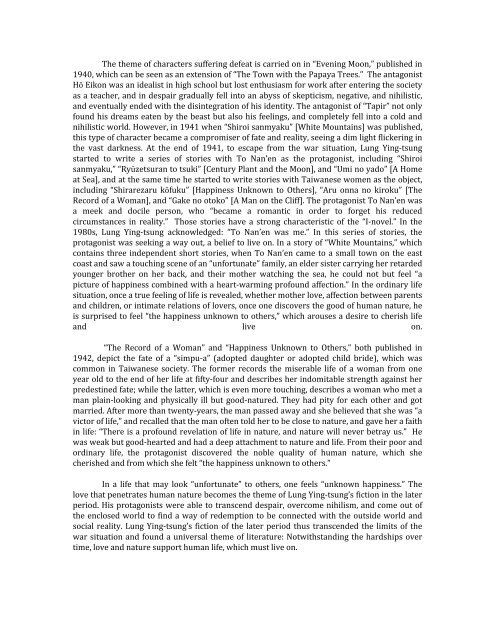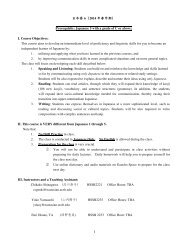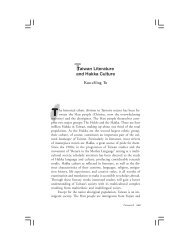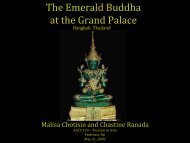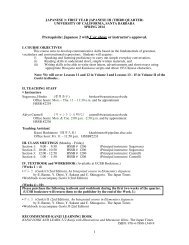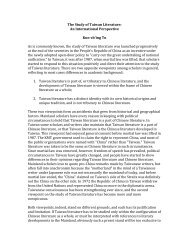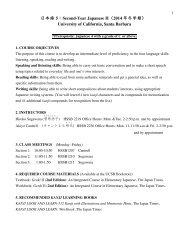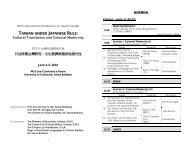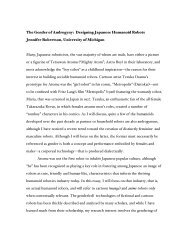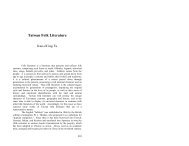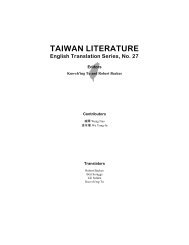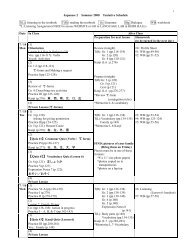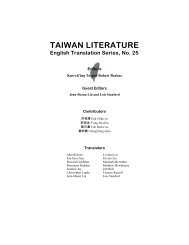L T - Department of East Asian Languages and Cultural Studies
L T - Department of East Asian Languages and Cultural Studies
L T - Department of East Asian Languages and Cultural Studies
Create successful ePaper yourself
Turn your PDF publications into a flip-book with our unique Google optimized e-Paper software.
The theme <strong>of</strong> characters suffering defeat is carried on in “Evening Moon,” published in 1940, which can be seen as an extension <strong>of</strong> “The Town with the Papaya Trees.” The antagonist Hō Eikon was an idealist in high school but lost enthusiasm for work after entering the society as a teacher, <strong>and</strong> in despair gradually fell into an abyss <strong>of</strong> skepticism, negative, <strong>and</strong> nihilistic, <strong>and</strong> eventually ended with the disintegration <strong>of</strong> his identity. The antagonist <strong>of</strong> “Tapir” not only found his dreams eaten by the beast but also his feelings, <strong>and</strong> completely fell into a cold <strong>and</strong> nihilistic world. However, in 1941 when “Shiroi sanmyaku” [White Mountains] was published, this type <strong>of</strong> character became a compromiser <strong>of</strong> fate <strong>and</strong> reality, seeing a dim light flickering in the vast darkness. At the end <strong>of</strong> 1941, to escape from the war situation, Lung Ying-‐tsung started to write a series <strong>of</strong> stories with To Nan’en as the protagonist, including “Shiroi sanmyaku,” “Ryūzetsuran to tsuki” [Century Plant <strong>and</strong> the Moon], <strong>and</strong> “Umi no yado” [A Home at Sea], <strong>and</strong> at the same time he started to write stories with Taiwanese women as the object, including “Shirarezaru kōfuku” [Happiness Unknown to Others], “Aru onna no kiroku” [The Record <strong>of</strong> a Woman], <strong>and</strong> “Gake no otoko” [A Man on the Cliff]. The protagonist To Nan’en was a meek <strong>and</strong> docile person, who “became a romantic in order to forget his reduced circumstances in reality.” Those stories have a strong characteristic <strong>of</strong> the “I-‐novel.” In the 1980s, Lung Ying-‐tsung acknowledged: “To Nan’en was me.” In this series <strong>of</strong> stories, the protagonist was seeking a way out, a belief to live on. In a story <strong>of</strong> “White Mountains,” which contains three independent short stories, when To Nan’en came to a small town on the east coast <strong>and</strong> saw a touching scene <strong>of</strong> an “unfortunate” family, an elder sister carrying her retarded younger brother on her back, <strong>and</strong> their mother watching the sea, he could not but feel “a picture <strong>of</strong> happiness combined with a heart-‐warming pr<strong>of</strong>ound affection.” In the ordinary life situation, once a true feeling <strong>of</strong> life is revealed, whether mother love, affection between parents <strong>and</strong> children, or intimate relations <strong>of</strong> lovers, once one discovers the good <strong>of</strong> human nature, he is surprised to feel “the happiness unknown to others,” which arouses a desire to cherish life <strong>and</strong> live on. “The Record <strong>of</strong> a Woman” <strong>and</strong> “Happiness Unknown to Others,” both published in 1942, depict the fate <strong>of</strong> a “simpu-‐a” (adopted daughter or adopted child bride), which was common in Taiwanese society. The former records the miserable life <strong>of</strong> a woman from one year old to the end <strong>of</strong> her life at fifty-‐four <strong>and</strong> describes her indomitable strength against her predestined fate; while the latter, which is even more touching, describes a woman who met a man plain-‐looking <strong>and</strong> physically ill but good-‐natured. They had pity for each other <strong>and</strong> got married. After more than twenty-‐years, the man passed away <strong>and</strong> she believed that she was “a victor <strong>of</strong> life,” <strong>and</strong> recalled that the man <strong>of</strong>ten told her to be close to nature, <strong>and</strong> gave her a faith in life: “There is a pr<strong>of</strong>ound revelation <strong>of</strong> life in nature, <strong>and</strong> nature will never betray us.” He was weak but good-‐hearted <strong>and</strong> had a deep attachment to nature <strong>and</strong> life. From their poor <strong>and</strong> ordinary life, the protagonist discovered the noble quality <strong>of</strong> human nature, which she cherished <strong>and</strong> from which she felt “the happiness unknown to others.” In a life that may look “unfortunate” to others, one feels “unknown happiness.” The love that penetrates human nature becomes the theme <strong>of</strong> Lung Ying-‐tsung’s fiction in the later period. His protagonists were able to transcend despair, overcome nihilism, <strong>and</strong> come out <strong>of</strong> the enclosed world to find a way <strong>of</strong> redemption to be connected with the outside world <strong>and</strong> social reality. Lung Ying-‐tsung’s fiction <strong>of</strong> the later period thus transcended the limits <strong>of</strong> the war situation <strong>and</strong> found a universal theme <strong>of</strong> literature: Notwithst<strong>and</strong>ing the hardships over time, love <strong>and</strong> nature support human life, which must live on.


